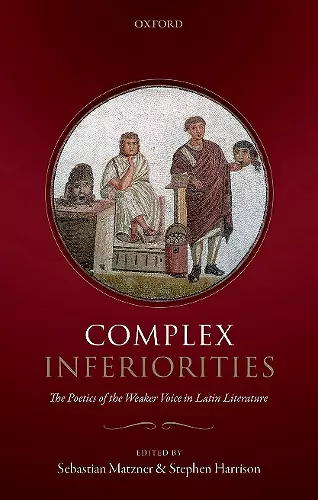Complex Inferiorities
The Poetics of the Weaker Voice in Latin Literature
Stephen Harrison editor Sebastian Matzner editor
Format:Hardback
Publisher:Oxford University Press
Published:13th Nov '18
Currently unavailable, and unfortunately no date known when it will be back

This volume investigates an important and surprisingly widespread phenomenon in Latin literature, which has to date received little sustained discussion: the deliberate assumption of a weaker voice by speakers who in fact hold sufficient status not to be forced into this position. Though often associated with the markers of imperial hegemony and elite speech, Latin literature evinces a remarkably broad range of strategies designed to enable the adoption of a markedly disempowered voice- from topoi such as recusatio (professing a lack of ability to write in status-conforming, superior genres) and rhetorical devices such as prosopopoeia (artfully and strategically adopting a persona to garner favour, even when this means temporarily forfeiting one's higher status and discursive privileges), to the long-silenced female heroines of Ovid's Heroides and satire's irreverent take on the great and the good by framing its narratives as being articulated 'from below'. Even large-scale cultural self-positionings fall within this scope, be they expressions of Roman cultural inferiority vis-à-vis classical Greece or the tensions that arise between humble (yet spiritually superior) Christian writers and their grand, canonical, and classical (yet pagan) predecessors. The intersecting case studies offered in Complex Inferiorities examine this phenomenon in a wide range of genres, periods, and authors. By demonstrating that re-negotiating alleged weakness constitutes a central activity in Latin literature, this volume reveals the extent of the literary and cultural-political possibilities opened up by assuming and speaking in voices of weakness and inferiority. Authored by experts in their fields, the individual chapters explore the crucial role of the 'weaker voice' in establishing, perpetuating, and challenging hierarchies and values in a wide range of contexts- from poetics and choices of genre, to social status and intra- and intercultural relations- thereby offering invaluable insights not only for the study of classics, but for literary and cultural studies across the humanities.
[T]his volume represents a series of essays that are closely connected by the theme, but also widely diverse. It has a lot to offer in terms of ideas and approaches that might be applied beyond the texts directly considered within * Kathleen Burt, The Classical Journal 116:4 (2021) *
Complex Inferiorities advances our knowledge of the interconnectedness of distinct types of hierarchies in Roman society, and of the manipulation of such hierarchies by Roman writers ... a welcome and forward-thinking volume. * Isaia Crosson, Classical World 113:4 (2020) *
consistently thoughtful and well argued, offering a kaleidoscopic examination of the hierarchies alternately reinforced and undermined by Latin authors from Plautus to late antiquity. ... Is there something oppressive, rather than subversive or empowering, in an elite poet impersonating a subaltern voice? Answers will vary, and this illuminating book explores a number of different possibilities. * James Uden, American Journal of Philology 141:3 (2020) *
The premise of need for such a collection is undeniable – the theme is of significant depth and interest, and one that has suffered without the attention of sustained treatment. ... Altogether, the cumulative illumination of these 'complex inferiorities' has provided a new, sharp critical perspective with which to consider Latin literature. * Celia Campbell, The Classical Review 70:1 (2020) *
This is a surprising and fascinating book ... the book is admirably proof-read and produced. * John Godwin, Classics for All *
ISBN: 9780198814061
Dimensions: 224mm x 148mm x 25mm
Weight: 538g
336 pages